Enter your details and we will be in touch with you shortly;
Or call
8655885566
between 8 am and 8 pm.


The usual kind of back pain might be caused by minor muscular issues or tension on your back. However, that isn’t always the case. If you have persistent back pain, do not ignore it. You could be suffering from one or even multiple back-related issues threatening your lifestyle, mobility, and flexibility, among others.
Your spine is made up of several components such as vertebrae, discs, spinal cord, nerves, etc. All these elements are crucial in fulfilling any movements such as standing, bending, running, resting, etc. A spinal disc is placed between two vertebrae (bone structures in the spine) as it acts as a shock absorber whenever you move, twist, bend, etc. One of the pressing issues with these discs is ‘degenerative disc disease’ or ‘DDD’. Let’s find out more about it and how you can treat it non-invasively.
Gradually, the disks between two vertebrae are subject to constant wear and tear causing them to become thinner and weaker that can lead to an array of issues. For instance, if the disk slips, bulges, or ruptures, it is called a herniated disk. Similarly, there’s spinal stenosis where the spinal canal becomes narrow; adult scoliosis happens when the spine curves to a great extent; and spondylolisthesis occurs when the vertebrae move out of their place and the umbrella term for these issues is ‘degenerative disk disease’ or ‘DDD’.
The term ‘degenerative’ may be misunderstood as progressive deterioration to the spine health. Although it is not entirely false, there are ample non-surgical solutions for disc degeneration borne out of natural, age-related, or other causes.
When it comes to the causes, degenerative disc disease mainly occurs due to aging, especially those over 40 years. Some people might begin to experience a degree of degeneration, however, there’s a possibility that you won’t experience any pain at all. Those who are smokers, obese, have acute injuries, or do a physically demanding job are at higher risk of developing this disease. Similarly, conditions like dried disc or cracked disk can cause it.
Degenerative disc disease sparks pain in the lower back or neck and may extend to the limbs i.e. hands and legs. The pain can be mild to moderate that can be treated at home and non-invasively while doctors might recommend surgery for those suffering from severe and long-term pain.
The pain associated with this condition can worsen with time if left unchecked. Additionally, you will feel worse when twisting, bending, or lifting something that requires the spine to make a wide range of motion. The pain may not be constant but rather start and stop which is more annoying.
Being overweight or obese inflicts countless health-related issues putting you at a higher risk of developing diseases such as heart-related conditions. Your spine supports and allows movements when you are standing, sitting or even resting. If there is more weight, the spine is subject to more stress on the joints especially in the front of the body.
It may result in degenerative disc disease and pull some serious damage to your body if you don’t keep a tab on your weight. No doubt a well-balanced diet consisting of all the nutrients, protein, and vitamins among others is highly recommended to lose weight and bring it to a sweet spot.
A balanced diet should be an utmost priority in your lifestyle. A well-balanced diet gives you all the nutrients, protein, vitamins, and minerals required for a healthy spine and overall health. An anti-inflammatory diet consisting of lean proteins, fruits, and veggies helps bring down inflammation caused around the degenerated disc region. Some examples include berries, fatty fish, leafy greens, etc. Moreover, a well-balanced diet helps with muscle growth and repair thereby strengthening the musculoskeletal structure.
Medications are a non-surgical treatment that helps you keep pain at bay. Nonsteroidal anti-inflammatory drugs (NSAIDs) help alleviate inflammation which is caused when the body repairs damaged cells using specialized cells. Aspirin, Naproxen, and Ibuprofen are key NSAIDs available over the counter.
Certain muscle relaxants reduce pain related to muscle spasms that can be extremely painful at times. Additionally, pain relievers can assist you to feel better until your doctor can prescribe something long-lasting for the pain and its treatment.
Poor blood circulation is a contributing factor in back pain cases. A weakening disc is closely associated with poor blood flow since the region may not be getting adequate blood that carries the necessary nutrients. Some other reasons are a sedentary lifestyle, smoking, excessive caffeine consumption, etc. Massage is an effective treatment for degenerative discs as it allows improved blood circulation leading to more oxygen and nutrients reaching the far extent of the spine. It can also help alleviate pain, reduce muscle spasms, and improve mobility as a result.
Acupuncture is another therapeutic and non-invasive technique known to stimulate improved blood flow and alleviates pain. It is a traditional Chinese therapy wherein needles are pierced under the skin at specific points known as ‘meridians’ corresponding to nerve pathways leading to affected diss. It helps the body release endorphins which are natural pain relievers.
There are certain exercises and movements that target specific muscles or regions helping them take off excess strain and improve muscle mass. You will be subject to such movements after the doctor has assessed the severity of DDD that helps select movements that will work aptly for you specifically.
Back pain may not sound too serious but it has serious implications on your lifestyle, mobility, movements, etc. You might not be able to stand or sit for a prolonged time or move as you would before the back issues kick-started. If that’s your condition too, you need professional help and that’s where we at QI Spine Clinic come into play. You can book an appointment at 086558 85566 now.
Visit our nearest clinic for your first consultation